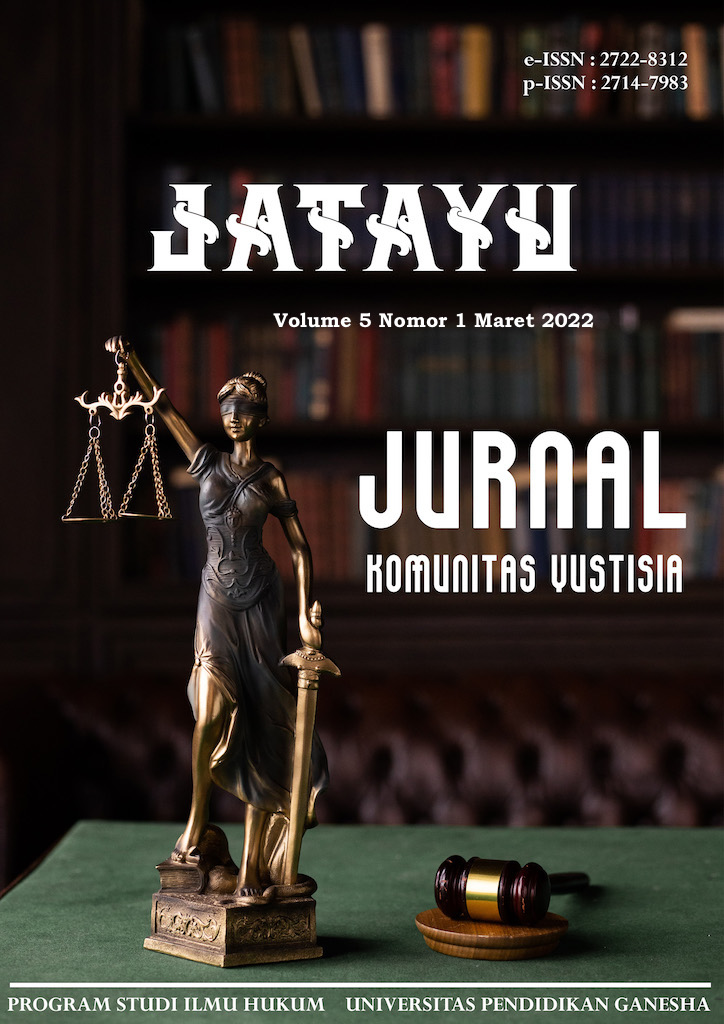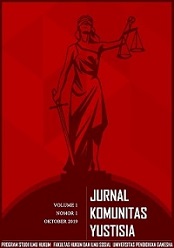TINJAUAN YURIDIS TENTANG PENCANTUMAN KLAUSULA EKSONERASI DALAM PERJANJIAN PINJAM MEMINJAM PADA FINANCIAL TECHNOLOGY BERBASIS PEER TO PEER LENDING
DOI:
https://doi.org/10.23887/jatayu.v5i3.51896Keywords:
Klausula Eksonerasi, Gagal Bayar, Peer to Peer LendingAbstract
Tujuan dari penelitian ini adalah untuk mengetahui dan menganalisa terkait bagaimana keabsahan dan akibat hukum yang ditimbulkan dari pencantuman klausula eksonerasi dalam perjanjian pinjam meminjam pada financial technology berbasis peer to peer lending dan Bagaimana seharusnya mitigasi risiko dan tanggung jawab penyelenggara terhadap pemberi pinjaman dalam hal terjadinya pinjaman gagal bayar pada financial technology berbasis peer to peer lending. Jenis penelitian yang digunakan adalah penelitian hukum normatif. Jenis pedekatan yang digunakan adalah Pendekatan Konseptual dan Pendekatan Peraturan Perundang-Undangan. Teknik analisis bahan hukum adalah pengolahan bahan hukum yang diperoleh dari penelitian kepustakaan. Adapun hasil penelitian menunjukan bahwa Adapun keabsahan perjanjian pinjam meminjam pada Fintech berbasi P2P Lending apabila terdapat klausula eksonerasi maka perjajian tersebut dapat batal demi hukum karena bertententangan dengan Pasal 1337 KUH Perdata. Selanjutnya mengenai akibat hukum beberapa aturan seperti Undang Undang Nomor 8 Tahun 1999 Tentang Perlundungan Konsumen memberikan sanksi berupa pidana penjara dan denda, sedangkan menurut POJK.07/2013 tentang Perlindungan Konsumen Sektor Jasa Keuangan adapun akibat hukumnya adalah dengan memberikan sanksi administratif seperti peringatan tertulis, denda, ataupun penutupan usaha. Pengaturan mitigasi risiko Fintech berbasis P2P Lending tercantum dalam BAB V POJK No.77/POJK.01/2016 Dan Mengenai tanggungjawab, dilihat dengan sistem perbankan, penyelenggara P2P Lending tidak jauh beda tugasnya dengan perbankan karena sama sama memperoleh kuasa dari pemberi pinjaman, namun dalam hal tanggungjawab saat berbeda dilapangan. Perbankan akan ikut bertanggungjawab apabila terdapat gagal bayar dengan melakukan penagihan atau sita aset, sedangkan penyelenggara P2P Lending tidak akan ikut bertangungjawab apabila terjadi gagal bayar karena belum adanya aturan yang mengatur hal ini.
Downloads
Published
Issue
Section
License

This work is licensed under a Creative Commons Attribution-ShareAlike 4.0 International License.
Authors who publish with this journal agree to the following terms: Authors retain copyright and grant the journal right of first publication with the work simultaneously licensed under a Creative Commons Attribution License that allows others to share the work with an acknowledgement of the work's authorship and initial publication in this journal. Authors are able to enter into separate, additional contractual arrangements for the non-exclusive distribution of the journal's published version of the work (e.g., post it to an institutional repository or publish it in a book), with an acknowledgement of its initial publication in this journal. Authors are permitted and encouraged to post their work online (e.g., in institutional repositories or on their website) prior to and during the submission process, as it can lead to productive exchanges, as well as earlier and greater citation of published work (See The Effect of Open Access). Authors who publish with this journal agree to the following terms: Authors retain copyright and grant the journal right of first publication, with the work [SPECIFY PERIOD OF TIME] after publication simultaneously licensed under aCreative Commons Attribution License that allows others to share the work with an acknowledgement of the work's authorship and initial publication in this journal. Authors are able to enter into separate, additional contractual arrangements for the non-exclusive distribution of the journal's published version of the work (e.g., post it to an institutional repository or publish it in a book), with an acknowledgement of its initial publication in this journal. Authors are permitted and encouraged to post their work online (e.g., in institutional repositories or on their website) prior to and during the submission process, as it can lead to productive exchanges, as well as earlier and greater citation of published work (See The Effect of Open Access).






